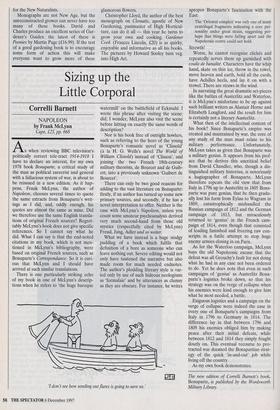Sizing up the Little Corporal
Correlli Barnett
NAPOLEON by Frank McLynn Cape, £25, pp. 668 As when reviewing BBC television's politically correct tele-tract 1914-1918 I have to declare an interest, for my own 1978 book Bonaparte, a critical study of the man as political careerist and general with a fallacious system of war, is about to be reissued in a new edition. As it hap- pens, Frank McLynn, the author of Napoleon, chooses several times to quote the same extracts from Bonaparte's writ- ings as I did, and, oddly enough, his quotes are almost the same as mine. Did we therefore use the same English transla- tions of original French sources? Regret- tably McLynn's book does not give specific references. So I cannot say what he did. What I can say is that the end-noted citations in my book, which is not men- tioned in McLynn's bibliography, were based on original French sources, such as Bonaparte's Correspondance. So it is curi- ous that McLynn and I should have arrived at such similar translations.
There is one particularly striking echo of my book in one of McLynn's descrip- tions when he refers to 'the huge baroque watermill' on the battlefield of Eckmuhl. I wrote this phrase after visiting the scene; did, I wonder, McLynn also visit the scene before hitting on exactly the same words of description?
Nor is his book free of outright howlers, such as referring to the hero of the young Bonaparte's romantic novel as 'Clissold' (a la H. G. Wells's novel The World of William Clissold) instead of 'Clisson', and joining the two French 18th-century military theorists, de Bourcet and de Guib- ert, into a previously unknown `Guibert de Bourcet'.
There can only be two good reasons for adding to the vast literature on Bonaparte: firstly, if an author has turned up some new primary sources, and secondly, if he has a novel interpretation to offer. Neither is the case with McLynn's Napoleon, unless you count some amateur psychoanalysis derived very much second-hand from those old mystics (respectfully cited by McLynn) Freud, Jung, Adler and so weiter.
What we have instead is a huge stodgy pudding of a book which fulfils that definition of a bore as someone who can leave nothing out. Severe editing would not only have tautened the narrative but also made room for much needed endnotes. The author's plodding literary style is var- ied only by use of such hideous neologisms as 'formulaic' and by utterances as clumsy as they are obscure. For instance, he writes I don't see how sending out flares is going to save us.' apropos Bonaparte's fascination with the East:
The 'Oriental complex' was only one of many centrifugal fragments indicating a core per- sonality under great strain, suggesting per- haps that things were falling apart and the Napoleonic centre could not hold.
Strewth!
Worse, he cannot recognise clicifds and repeatedly serves them up garnished with coulis de banalit 6. Characters have the whip hand, skate on thin ice, throw in the towel, move heaven and earth, hold all the cards, have Achilles heels, and lay it on with a trowel. There are straws in the wind.
In narrating the great dramatic set-pieces like the battles of Austerlitz and Waterloo, it is McLynn's misfortune to be up against such brilliant writers as Alastair Horne and Elizabeth Longford, and the result for him is certainly not a literary Austerlitz.
What then of the intellectual content of his book? Since Bonaparte's empire was created and maintained by war, the core of any study of the man must relate to his military performance. Unfortunately, McLynn takes as given that Bonaparte was a military genius. It appears from his pref- ace that he derives this uncritical belief from David Chandler, who, though a dis- tinguished military historian, is notoriously a hagiographer of Bonaparte. McLynn therefore repeats the old view that from Italy in 1796 up to Austerlitz in 1805 Bona- parte was pure genius, that he then gradu- ally lost his form from Eylau to Wagram in 1809, catastrophically mishandled the Russian campaign of 1812 and the German campaign of 1813, but miraculously returned to 'genius' in the French cam- paign of 1814, even though that consisted of leading famished and freezing raw con- scripts in a futile attempt to stop huge enemy armies closing in on Paris.
As for the Waterloo campaign, McLynn buys the old Napoleonic excuse that the defeat was all Grouchy's fault for not doing what he had in any case not been ordered to do. Yet he does note that even in such campaigns of 'genius' as Austerlitz Bona- parte's logistics broke down, so that his strategy was on the verge of collapse when his enemies were kind enough to give him what he most needed, a battle.
Exiguous logistics and a campaign on the verge of collapse were indeed the case in every one of Bonaparte's campaigns from Italy in 1796 to Germany in 1814. The difference lay in that between 1796 and 1809 his enemies obliged him by making peace after their initial defeats, while between 1812 and 1814 they simply fought dourly on. This eventual recourse to pro- tracted war doomed the Bonapartian strat- egy of the quick 'in-and-out' job while living off the country.
As my own book demonstrates.
The new edition of Correlli Barnett's book, Bonaparte, is published by the Wordsworth Military Library.


















































































 Previous page
Previous page